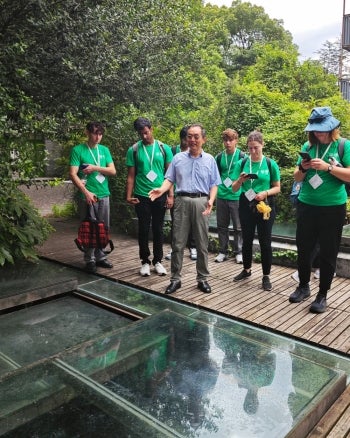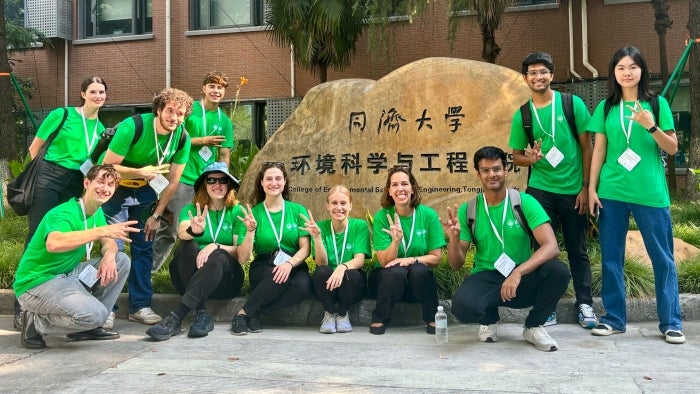Inspiring new environmental engineering insights
Collaboration between ASU and Tongji University provides students with fresh ideas to solve water and environmental challenges

Participants of the 2024 Tongji University Environmental Science & Engineering Summer School program pose with a sign welcoming new students to the university’s College of Environmental Science and Engineering. The Ira A. Fulton Schools of Engineering at Arizona State University worked with Tongji University to create a new global experience to foster collaboration and the exchange of ideas about engineering solutions to common environmental challenges. Photo courtesy of Mackenzie Boyer
Water is one of our most precious natural resources, and societies around the world are facing challenges to manage it. Whether dealing with water scarcity, storm runoff or contaminated sources, engineers are hard at work to address these issues.
International collaboration is vital for engineers to better address the shared challenges we face.
Just before the start of the fall 2024 semester, six students and a faculty member from the Ira A. Fulton Schools of Engineering at Arizona State University traveled to Tongji University in Shanghai, China, to learn new approaches to solving environmental issues from the university’s College of Environmental Science and Engineering faculty members and graduate students.
“International exchange opportunities like this provide valuable insight into the policies and practices of other countries on critical engineering topics, such as environmental engineering,” says ASU President's Professor Teresa Wu, associate dean of global engagement in the Fulton Schools. “Partnering with a top university like Tongji offers ASU students an excellent chance to explore diverse engineering solutions and broaden their perspectives on innovative approaches to water treatment, air quality, waste management and other challenges.”
Joined by two students from the Georgia Institute of Technology and one student from Rutgers University, the inaugural cohort learned from Tongji researchers about strategies for urban water and sewage management, edible coatings to preserve produce, renewable energy strategies, and the effects and removal of environmental contaminants.
Over the five-day program, the participants also visited sites on the university’s campus and around Shanghai that demonstrate the country’s history of environmental engineering solutions.
“We aimed to foster cross-cultural academic exchange and bring together diverse perspectives on environmental science and engineering,” says Hanyu Lai, Tongji University program coordinator for international affairs. “The visiting students and faculty from Arizona State University brought fresh perspectives and new ideas to our discussions. Their insights into sustainable practices, especially in areas like urban development and water management, enriched our understanding.”
A collaboration between environmental engineering leaders
ASU Regents Professor Bruce Rittmann, who gave a virtual keynote address for the summer school program, has been collaborating with researchers at Tongji University for about 20 years on leading environmental science and engineering work.
Rittmann is a faculty member in the School of Sustainable Engineering and the Built Environment, part of the Fulton Schools, and serves as the director of the ASU Biodesign Swette Center for Environmental Biotechnology. Since the center’s founding in 2005, Rittmann has hosted many international students and postdoctoral researchers who bring the concepts, methods and contacts they gain at ASU back to their home countries.
“Environmental challenges are universal, so researchers around the world share the same priorities,” Rittmann says.
To enhance the international exchange of ideas for important environmental issues, Rittmann helped Tongji University organize this first-of-its-kind summer school program and recruit students from ASU and other U.S. institutions to participate.
Gaining a global perspective on global issues
Mackenzie Boyer, a Fulton Schools assistant teaching professor in the civil and environmental engineering programs, says she was excited to participate in this experience due to her EVE 394 Global Environmental Perspectives course, in which students watch documentaries as a foundation to discuss different environmental issues. Two of the documentaries take place in China, so Boyer gained a firsthand look at the subjects she and her students discuss in class.
“Engineering does not exist in a bubble,” she says. “If we are not designing the type of projects that the clients or public want, or we’re not understanding how they view the environment themselves, then we’re missing out on a big opportunity to do our engineering work well.”
Riley Berg, who is completing a master’s degree in civil, environmental and sustainable engineering through the Accelerated Master’s degree program, works as a researcher in the Swette Center. She is interested in solving water issues and making a difference in her community.
“My perspective on environmental issues is very United States-centric, so I wanted to see how environmental challenges are described at a university across the world and compare it to my own experiences,” Berg says. “This trip has given me a much more worldly perspective on how environmental problems affect everyone.”
Ethan Sheard, a mechanical engineering junior in the major’s energy and environment concentration, was interested in gaining new perspectives on lowering energy and chemical consumption during water treatment.
“Tongji faculty discussed not only water treatment, but how water can be recollected and restored more efficiently,” Sheard says. “In the future, I would like to apply this line of thinking to energy and ways that we can generate it cleanly and how we can recover losses.”
The program also drew the attention of computer science senior Siddhant Jain, who thought it would be a great opportunity to learn about a new culture and explore new facets of an issue important to him.
“I believe that sustainability is a unifying principle that connects all fields of study, regardless of one's major," Jain says. “By leveraging computer science, I think we can improve water treatment processes, enhance the safety and quality of water and achieve greater operational efficiency through approaches like predictive modeling and machine learning."
Jain left the experience with new ideas for how he could apply what he learned to his future computer science work and as a student in the Grand Challenges Scholars Program.
Experiencing engineering and culture firsthand
Rittmann says the program is a good opportunity for U.S. students to see how China is addressing some of the same environmental issues that have also affected their own country, including nutrient pollution in water, smog in urban areas and groundwater contamination. While some solutions are similar to what the U.S. students have learned about, he says others may have been surprising for the students to experience, such as the abundance of electric vehicles in China due to differing adoption strategies in the country.
The participants had the opportunity to see environmental science and engineering labs and working prototypes on campus based on research by Tongji University Professor Siqing Xia.
They also visited a water treatment plant and Mengqing Garden, which included an exhibit about the pollution and rehabilitation of the Suzhou River. For Berg, the Shanghai Water Gate Museum was a highlight for its look into the history of water infrastructure in the city.
“It was especially cool to see a more than 700-year-old sluice gate that was used to help control silt in the river,” Berg says.
In the evenings, Boyer and the students went out to see the sights in Shanghai and enjoy the food and culture. Experiencing a new culture was one of the most memorable parts of the experience for the students.
Jain says he particularly enjoyed learning a few phrases in Mandarin and connecting with Chinese students, riding a maglev train that travels at more than 180 miles per hour, and viewing the city from Shanghai Tower, the third tallest building in the world.
Ongoing global experiences
Boyer and Wu are looking at ways to expand international exchange opportunities with Tongji University faculty and students next summer and beyond.
Hannah Collins, a civil, environmental and sustainable engineering doctoral student, says she was eager to be part of the first international collaborative program between U.S. and Tongji University students and faculty members. She recommends other students participate in future iterations of the summer school experience.
“The insights and inspiration I gained from this program have deepened and broadened my environmental knowledge, enhanced my career prospects and empowered me to contribute more effectively to worldwide sustainability,” Collins says. “This experience enriched my understanding and commitment to environmental stewardship on a global scale. Understanding and addressing environmental issues collectively is crucial; only through united efforts can we ensure a sustainable future for all, preserving Earth for generations to come.”
Pictured in lead image: Students from Arizona State University, Georgia Institute of Technology and Rutgers University pose with ASU faculty member Mackenzie Boyer (standing second from right), Tongji University Vice Dean Ying Wang (front right), Professor Siqing Xia (kneeling at left) and Hanyu Lai (second from left), program coordinator for international affairs at Tongji University. The participating ASU students include civil, environmental and sustainable engineering doctoral student Hannah Collins and graduate students Riley Berg and Sara Curry; computer science undergraduate student Siddhant Jain; mechanical engineering undergraduate student Ethan Sheard; and chemical engineering undergraduate student Pranav Bhavaraju. They were joined by Georgia Institute of Technology students Jennie Baker and Bishop Uhlrich, and Rutgers University student Adam El Abboudy.



